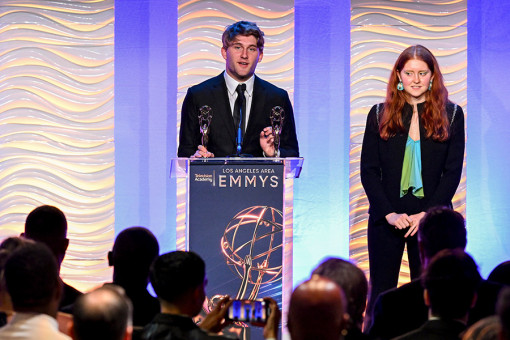Early in the run of The Good Doctor, the ABC series about a physician with autism and savant syndrome, writer-producer David Renaud attended a party at the home of a showrunner for another series. Renaud, a former medical doctor who uses a wheelchair after being paralyzed in a car accident at 19, said he had wanted to work on The Good Doctor in part, because, "I liked that the lead had a disability. I really wanted to tell that story, because I thought I could bring a lot to that room of an authentic point of view."
Renaud had wanted to meet the showrunner because he was a fan. But when the showrunner learned where Renaud worked, the situation quickly reversed when the man said he was "a huge fan" of Renaud's. "The story he told me," Renaud recalls, "was that his daughter was on the [autism] spectrum. And she said, 'I've never seen a character who had a great professional career [and] was on the spectrum, until this show.'"
For any marginalized community, representation on television and behind the scenes matters. Almost one in four people in the United States has a disability, yet a 2021 study showed that only 3.1% of characters in TV and film have disabilities, and more than 95% of disabled characters on TV are played by non-disabled actors. The challenges and strategies for attaining greater equity in the television industry were the focus of the Television Academy Foundation public program "The Power of TV: Ensuring Authentic Disability Inclusion," the latest of the Foundation's initiative that explores television's enormous influence on societal perspectives and norms.
Besides Renaud, panelists at the March 7 event included Lauren Appelbaum, senior vice president, entertainment & news media, RespectAbility; performer Eileen Grubba (This Is Us, New Amsterdam); Tari Hartman Squire, CEO, EIN SOF Communications, Inc. and Lights! Camera! Access!; and performer Sue Ann Pien, (As We See It, The Ghost and Molly McGee). Pioneering industry executive and DEIA expert Karen Horne moderated the program, which was held at the Academy's Saban Media Center in the NoHo Arts District and also livestreamed.
Grubba, who has a mobility disability — she was paralyzed from the waist down as a child but can walk due to multiple surgeries and her own determination — said that she has difficulty being cast because of the way she walks, and has often played sex workers, drug addicts and villains.
"I don't know why I can't play a mom or a sister or a judge or a doctor," she says. "It took me 30 years even to get a fair shot to get on a medical show. And that was New Amsterdam. They changed our industry because they started authentically including [performers with disabilities]. Why wouldn't you let people with extreme and different life experiences light up your characters?"
Indeed, much of the time, if a character has a disability, the story focuses on the disability, not the character as a regular person who happens to have a disability, Horne said. Various individuals and groups are working to increase the current 1% of WGA members with a disability, Squire noted.
Grubba noted that scripts typically specify the disability, but Appelbaum, who has the chronic-pain-related disability reflex sympathetic dystrophy, said, "In most cases, it doesn't need to be specific. The hope is that I'm talking to someone [as a consultant] while the show is still in the very early stages, where we can say, 'Why don't you go out and cast someone and make this wider net, where you're not saying this [particular] disability which represents a small population, but can you have all mobility disabilities, for example? And then, once you cast the person, you can write the script to that person.' When I've seen series do that, it is always a huge success. When I've seen series look at it very narrowly and bring someone in who may or may not be the best person for the role, it usually doesn't go past one season."
Also, counter to the assumption that hiring people with disabilities on- or offscreen is too expensive, Applebaum said that insurance costs do not increase. And including accommodations from the beginning of a show, such as a wheelchair ramp, preempts additional expenses later in a production.
Squire, a longtime consultant on disability issues, noted that there are numerous resources when it comes to disability issues, real or potential. When it comes to performers, "The Casting Society of America has recorded over 800 actors with disabilities," she said. "So, when someone says, 'I don't know where to find them,' guess what? They're in your vault."
Said Pien, who is on the autism spectrum, "You have to think about opening the doors now. You have to let people go out and audition and fail. If you don't give people in wheelchairs, autistic actors, [other] disabilities, even the opportunity to know what that's like, they're never going to become competitive. They're never going to have the experience they need to, to know what to do on set, how to ask that advocate, all that stuff."
The Good Doctor, in fact, was criticized for not hiring an actor on the spectrum in Freddie Highmore's title role as Dr. Shaun Murphy. Renaud had advocated from season two to bring in an actor or actress with autism to play a medical student who'd seen a viral video of Murphy saving a boy's life and was inspired to become a doctor. For its current sixth and final season, the show cast Kayla Cromer, who has autism, in a recurring role as that third-year medical student.
While there are gatekeepers in the industry, there are also ways to makes one's talents available to industry decision makers by posting work online, panelists said. "You can create your own content, leverage your brand," Squire said. "Leverage your disability to sharpen your competitive edge."
















